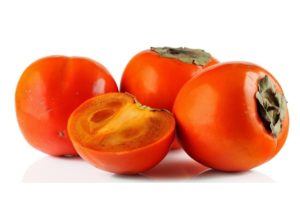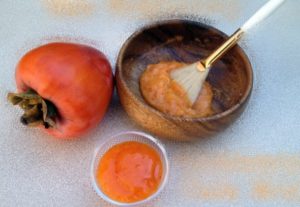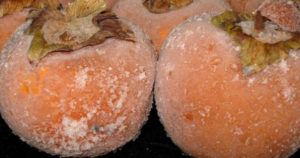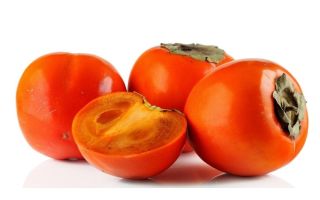Content
- 1 Persimmon chemical composition
- 2 Nutritional value and calorie content of persimmons
- 3 Why is persimmon useful for the body
- 4 Is persimmon possible for pregnant and lactating
- 5 At what age can persimmon be given to children
- 6 Is persimmon good for weight loss
- 7 Features of the use of persimmon in diabetes
- 8 Persimmon treatment
- 9 The use of persimmon in cosmetology
- 10 The benefits of dried and dried persimmons
- 11 Is there a benefit in frozen persimmon
- 12 How to eat persimmons
- 13 Possible harm to persimmon and contraindications
- 14 How to choose and store persimmons
- 15 Conclusion
The benefits and harms of persimmon are relative and depend on who, why and in what quantities eats it. Like any natural food product, it has its pros and cons, and the only question is what is more in each case.

Persimmon chemical composition
The ratio of BJU in the composition of persimmon is uneven - it is a product containing a large amount of carbohydrates. In addition, persimmon has a high nutritional value (one fruit contains approximately 120 kcal).
In general, 100 grams of the product accounts for:
- 33 grams of carbohydrates;
- 0.8 grams of protein;
- 0.4 grams of fat;
- 64 grams of water.
Of the vitamins, the product contains vitamin C and various types of vitamin B, as well as alpha-carotene (260 mg) and beta-carotene (1200 mg) and provitamin A, and besides, persimmons are rich in minerals. Most of this fruit contains the following macro- and microelements:
- potassium - 200 mg;
- calcium - 127 mg;
- copper - 110 mg;
- iodine - 60 mg;
- magnesium - 56 mg;
- phosphorus - 26 mg;
- sodium - 15 mg;
- iron - 2.5 mg.
The fruit also contains fiber, pectins, glucose and fructose.
Nutritional value and calorie content of persimmons
The calorie content of persimmons per 100 grams depends on whether they are fresh or processed in some way.
So, 100 grams of fresh fruit contains 65–70 kcal (approximately 270 KJ), in dried and dried form there are much more calories.
The calorie content of dried persimmon is almost three and a half times higher than that of fresh persimmon, and is 270 kcal per 100 grams, and the nutritional value of dried fruit is slightly lower - 230 kcal.
Why is persimmon useful for the body
The benefits and harms of persimmon for human health depends on both the amount of food eaten and its quality, as well as on the general state of human health. Nevertheless, it still has significantly more useful properties, due to the high content of valuable chemical elements.
Thanks to the vitamins it contains, persimmon is useful as a prevention of vitamin deficiency, as well as as a means to maintain immunity. With its help, it is possible to improve (or maintain) eyesight.
Due to the large amount of antioxidants, the use of persimmons in food has a beneficial effect on the general well-being of the body, improves the condition of hair, nails, and skin. Calcium, in turn, strengthens teeth and bones. Potassium contained in fruits strengthens and dilates blood vessels, which means it helps to normalize blood pressure. Useful fruit and hypotensive. Due to the anti-stress effect, you can use persimmon at night, of course, if you are not overweight.
There is also a benefit from persimmon seeds - they can be used to make a drink that resembles coffee (as they do in Japan). For this, the bones are fried and crushed.This drink can be used as a potency improving agent.
In addition, antioxidants and vitamins C and B can be used as cancer prevention.
The benefits of persimmon for a man's body
In addition to the general improvement of the body, vitamin A and vitamin C are especially useful for men. Vitamin A affects the reproductive system and helps to improve reproductive function. Vitamin C strengthens the body, improves immunity, which is useful for workers not only physical, but also mental labor.
In addition, persimmon has a beneficial effect on the cardiovascular system, which is very important for older men.
The health benefits of persimmon for women
The anti-aging and revitalizing properties of the fruit are especially beneficial for the female body. Antioxidants slow down aging and improve well-being. The fruit also affects the state of the reproductive system, improving reproductive function and alleviating the condition during the first phase of the menstrual cycle. It has a good effect on the nervous system and on the thyroid gland (due to the high iodine content), which is often important for women.
In addition, due to the fact that persimmon weakens and removes toxins from the body, it is sometimes used for weight loss (however, the benefits of this fruit are questionable for weight loss).
It is also used for cosmetic purposes - as part of face masks.
Useful properties of persimmon for the elderly
The benefits of persimmon are noticeable for women after 50, especially with regard to the effects of antioxidants, as well as with the onset of menopause. However, in general, for people of age, those properties of the fruit that heal the body will be relevant, that is, strengthening the immune system, the cardiovascular system and normalizing blood pressure, as well as preventing cancer.
Is persimmon possible for pregnant and lactating
If there are no individual contraindications to eating this fruit, then you can eat it both during pregnancy and during breastfeeding. However, as is the case with most fruits, berries and vegetables, you need to gradually introduce them into your diet during this period, and most importantly, stop on time.
During the period of feeding, it is better to start eating persimmons with one slice, then, if the baby does not show signs of allergies, you can gradually increase the amount of the product consumed. But it is better to limit yourself to one, maximum two fruits per day.
In general, the benefits of persimmon for pregnant and lactating women are quite significant due to vitamins, as well as the calcium it contains.
At what age can persimmon be given to children
In the case of the introduction of persimmon into a child's diet, the following principle works: "The later, the better." It is strongly not recommended to give this fruit to children under three to four years old, since during this period the digestive system is rather weak, and it is too easy to harm it. Since this fruit contains, among other things, astringents, thanks to which toxins are removed, it is useful for adults, but can be dangerous for the health of the child.
However, this fruit rarely causes allergies, so starting from the age of four (or better still, from the age of five) it can already be given to children, of course, in small quantities.
It can be given both fresh and dried or jerky. Can be used as a filling or ingredient in a dish.
Is persimmon good for weight loss
There are different opinions on this matter. Someone believes that, due to its relatively low calorie content and laxative properties, persimmon can be used for weight loss, someone believes that it cannot.
In general, some varieties of fruit are characterized by a reduced calorie content - up to 55 kcal per 100 grams, but the fruit is still not very suitable for losing weight. The second opinion can be supported by the following arguments:
- The fruit contains a large amount of carbohydrates, which does not contribute to weight loss (many diets require a decrease in the carbohydrate part of the menu).
- In dried and dried form, the calorie content increases sharply.
- Does not contribute to weight loss and a large amount of glucose and fructose in the product.
- Because the fruit contains tannin (an astringent), eating it too often can lead to intestinal obstruction.
However, it is still possible to use this fruit in small quantities for weight loss - due to the large amount of fiber, it creates a feeling of satiety. However, as the main - or commonly consumed - component of the persimmon diet is not only useless, but can also harm the body.
Features of the use of persimmon in diabetes
The peculiarity of eating this fruit is associated with the existence of two types of diabetes. Since in the first type, insulin is practically not produced by the body, and, therefore, sugar does not break down - and persimmons contain a large amount of sugar and fructose - it is strictly forbidden for patients with the first type to eat this fruit.
With the second type of diabetes, it is still possible to eat persimmons, but with great care, since its glycemic index is much higher than the recommended index for foods. It can be consumed only in small portions (no more than 100 grams per day) and only if the blood sugar level is correct.
In general, it is still better not to take risks with foods that are unsuitable for the body, and consult a doctor before eating.
Persimmon treatment
This fruit can be used to treat:
- colds;
- hemophilia;
- hypertension;
- swelling.
To reduce puffiness, tea from the leaves of this fruit is used: for this, pour several leaves with a cup of boiling water, cover with a saucer and let it brew for half an hour.
For the treatment of hypertension, a drink is prepared from this fruit: the fruit is peeled, pitted, crushed (it is advisable to have a blender for this) and mixed with milk (one and a half glasses of milk per fruit). Drink three times a day for half a glass, for 7-10 days.
For the treatment and prevention of colds, the fetus is also removed from the bones, crushed and poured with a glass of hot water. Let it brew for 10-15 minutes, then gargle.
The use of persimmon in cosmetology
The persimmon has also found its application in cosmetology.
Face masks
Thanks to antioxidants, persimmon improves skin condition, rejuvenates, nourishes and moisturizes it.

Oil-reducing mask
Ingredients:
- a tablespoon of persimmon pulp;
- a tablespoon of sour cream;
- 1 egg white;
- 10 ml of vegetable oil.
All ingredients are mixed, applied to the face and left in the mask for 30 minutes.
Acne mask
Ingredients:
- 1 tablespoon chopped pulp
- 1 egg white.
Beat the ingredients until smooth, apply the mask on the face and keep for 15-20 minutes.
Persimmon for hair beauty
In general, simply eating the fruit can be done to improve hair condition. The main thing is to do it regularly enough. However, homemade masks can also be used for healthy, shiny and manageable hair.
Hair Mask
Ingredients:
- 2 tablespoons of persimmon pulp;
- 1 tablespoon oatmeal, minced
- 2 tablespoons of kefir.
You will also need a hat or plastic bag.
The ingredients are mixed until smooth, then applied to dry hair, put on a hat (if you don't have a hat on hand, put on a bag and secure with tape) and leave after half an hour. After half an hour, wash off the mask with water and wash your hair with shampoo.

The benefits of dried and dried persimmons
The benefits of dried persimmon for the body are almost similar to those of fresh fruit, but it is more concentrated, so its beneficial properties even increase. So, in dried and jerky form, it helps to increase the level of hemoglobin, strengthen the cardiovascular system of the body and increase immunity.
However, it is more high in calories, so it will not work to use the fruit for weight loss.

Is there a benefit in frozen persimmon
Freezing is a great way to store this fruit for two reasons:
- All useful properties are preserved in it.
- When frozen, tannin is destroyed, therefore, the viscosity and harm from this fruit decreases.
In addition, after freezing, the fruit becomes sweeter, and you can freeze it for up to six months. For long-term storage, it is better to use the most ripe fruits. To improve the taste and reduce harm, you can send unripe fruits to the freezer for 1-2 days, then their negative properties will practically disappear.

How to eat persimmons
Persimmons can be eaten both fresh and as part of various dishes. However, when choosing a fruit for food, you need to remember that in an unripe form, this fruit can negatively affect the digestive system. Therefore, only ripe - and therefore soft - fruits should be chosen for food.
In addition, the skin of the fruit contains tannins (astringents) that can be harmful to the gastrointestinal tract, so it is best to remove the skin before eating - or before cooking.
Possible harm to persimmon and contraindications
In large quantities, the product can be harmful to digestion (it is better not to eat persimmons on an empty stomach), so you should limit yourself to 1-2 copies per day.
Contraindications include:
- allergies or individual intolerance;
- anemia;
- type 1 diabetes mellitus;
- any diseases of the gastrointestinal tract;
- obesity;
- age up to three to four years.
How to choose and store persimmons
Since unripe fruits can harm the body, choose the ripe and softest ones for food. The elasticity of the fetus means its immaturity, so do not give in to stereotypes that a soft fruit is a fruit that has begun to deteriorate. Persimmons can be stored fresh, frozen and dried.
Store fresh fruits in a cool, well-ventilated place. They are not washed before storage. The shelf life is limited to 2–3 months.
Dried fruits are washed before drying, removed from the skin, cut into slices and sent to the dryer or oven (temperature - 50 degrees, kept for 40 minutes - an hour). Readiness is determined by color - the slices should be light. Store up to 3 months.
When frozen, the fruits are washed, dried and sent to the freezer. Store up to six months. You can also pre-cut them into slices.
Conclusion
The benefits and harms of persimmon depend not only on the amount of food consumed, but also on the correctness of eating it. In general, if you remember about the existing contraindications, and also observe moderation in use, there will be no harm from this fruit.

